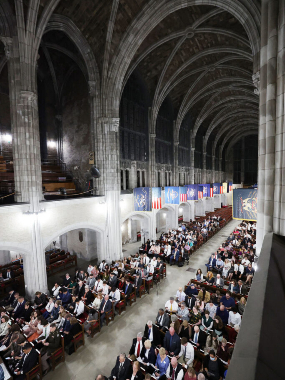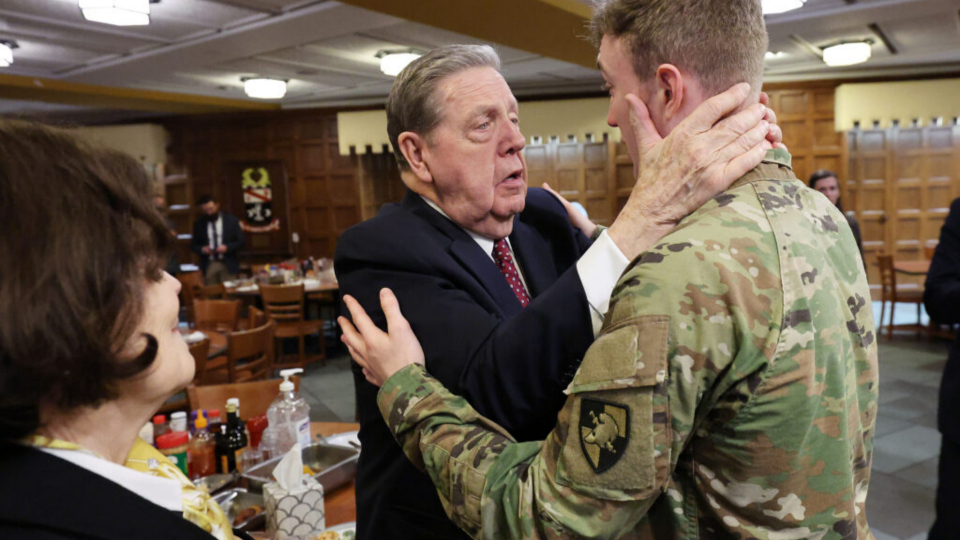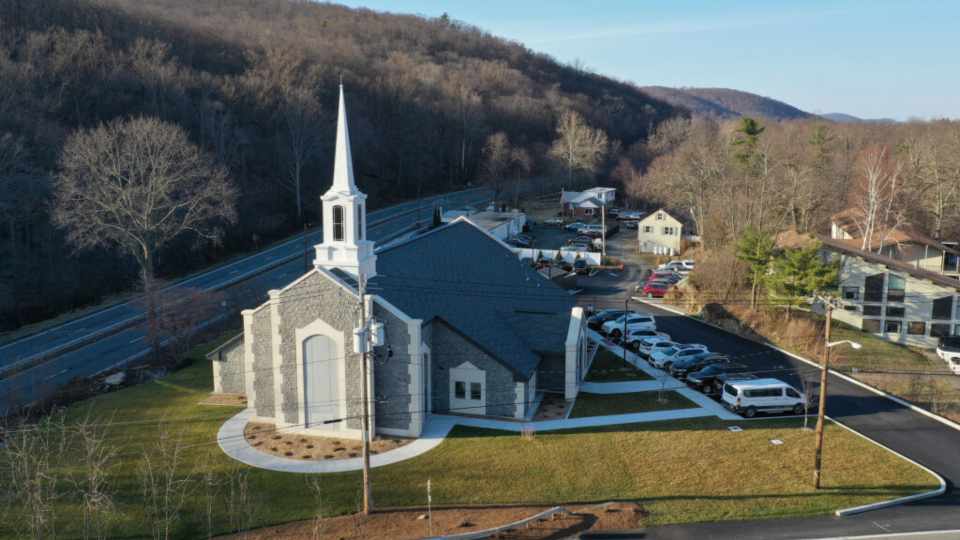- Holland-West-Point
- Holland-West-Point
- Holland-West-Point
- Holland-West-Point
- Holland-West-Point
- Holland-West-Point
- Holland-West-Point
- Holland-West-Point
- Holland-West-point
- Holland-West-Point
- Holland-West-Point
- Holland-West-Point
- Holland-Westpoint2.jpg
| Temple Square is always beautiful in the springtime. Gardeners work to prepare the ground for General Conference. © 2012 Intellectual Reserve, Inc. All rights reserved. | 1 / 2 |
This story appears here courtesy of TheChurchNews.com. It is not for use by other media.
By Sarah Weaver, Church News
WEST POINT, New York
During a time of international conflict and war — more than 150 years after the first Latter-day Saint entered a United States military academy — Elder Jeffrey R. Holland stood in the historic Cadet Chapel at West Point and addressed those who serve in defense of freedom.
“We are as sobered and sad as you are about what is happening in Eastern Europe,” said Elder Holland of the Quorum of the Twelve Apostles on Friday, March 18. “A tragedy is unfolding for people we love and people we know, people we have prayed with and wept with, laughed with and worshiped with.”
Of those whose daily experiences are defined by the horrors of war and all that ripples from them, Elder Holland said “life is going to be very difficult for very innocent people.”
Speaking during a commemoration event marking Latter-day Saints at the United States Military Academy, Elder Holland looked back on the history of The Church of Jesus Christ of Latter-day Saints at the academy and forward to the continued contributions Church members will make as officers in the United States Army.

Holland-West-Point
Elder Jeffrey R. Holland of the Quorum of the Twelve Apostles of The Church of Jesus Christ of Latter-day Saints and his wife Sister Patricia Holland attend the Latter-day Saints sesquicentennial commemoration in the Cadet Chapel at the United States Military Academy at West Point in West Point, NY on Friday, March 18, 2022. Photo by Jeffrey D. Allred, courtesy of Church News.Copyright 2022 Deseret News Publishing Company.He noted that Eastern Europe is “not the only place there is trouble in the world” and this is “not the only time” that peace has been threatened. The world needs resilient leaders who can handle “dissonance, surprise, disappointment and fear,” he said.
Traveling to New York with Sister Patricia Holland, Elder Holland’s remarks during the sesquicentennial celebration of Latter-day Saint cadets were the capstone of a busy day for the senior Church leader at West Point — including lunch in the cadet mess hall and the dedication of the new chapel near the academy.
West Point
Located north of New York City, on a scenic bend in the Hudson River, West Point was founded in 1802, producing numerous notable military, political, business and civic leaders in U.S. history. In 1871, Willard Young — a son of President Brigham Young — become the first Latter-day Saint to join the West Point community. His father told him that the academy would give him an “uncalculatable advantage,” explained U.S. Military Academy Command Historian Sherman Fleek, who spoke at the commemoration. Brigham Young said to his son, “You are thereby enjoying a privilege which falls to the lot of comparatively few. You will do well to treasure up the instruction so abundantly provided there, that after you may be prepared to take a place in the foremost ranks of the great men of the nation.”
Appointed during a time of continued persecution for the Church, Willard Young graduated fourth in his class — setting in motion what is today a century and a half of Latter-day Saint relations at the academy.
Willard Young’s son and grandson would follow him to West Point.
Fleek said the commemoration, as well as the dedication of the Church’s chapel near West Point, mark a “remarkable day” for the academy — unforeseen by Willard Young. “We have come a long way,” he said.
Holland-West-Point
A 1864 parrot rifle is displayed at the United States Military Academy at West Point museum in West Point, N.Y., on Friday, March 18, 2022. Photo by Jeffrey D. Allred, courtesy of Church News.Copyright 2022 Deseret News Publishing Company.
Elder Holland put it in perspective.
When Willard Young entered the academy there were 170,167 members of the Church spread across 10 stakes and 524 wards, all in the United States, said Elder Holland. A century and a half later, there are now almost 17 million members of the Church spread across more than 3,400 stakes, 31,000 wards, in 196 countries, and who speak in 128 languages.
The Church organized a branch at West Point in 1956; cadets met on campus in either Bartlett or Thayer halls.
Elder Holland visited the academy in 2010 and initiated efforts to provide a chapel in which the cadets could worship. The effort “took some doing,” as leaders worked with the academy and headquarters. The result is the “strikingly, beautiful new building” — which will serve the cadets, young single adults in the area and another unit from the Newburg New York Stake.
But the real legacy of the academy is “of course the young people coming here,” said Fleek, noting that more than 200 of them have resigned their commission to serve missions before being readmitted and completing their time at the academy.
A Need for Leadership
As unusually mild temperatures burned off the morning fog along the Hudson River, Elder Holland met with Latter-day Saint cadets and faculty and other leaders on campus in the Cadet Mess Hall. He was joined by Col. Wilson Rutherford and Chaplain Matthew Pawlikowski.

Holland-West-Point
Elder Jeffrey R. Holland of the Quorum of the Twelve Apostles of The Church of Jesus Christ of Latter-day Saints has an emotional talk with Cadet Brody Low at the United States Military Academy at West Point in West Point, N.Y., on Friday, March 18, 2022. Holland meet with Latter-day Saint West Point cadets in the Cadet Mess Hall of Washington Hall. Photo by Jeffrey D. Allred, courtesy of Church News.Copyright 2022 Deseret News Publishing Company.After observing the cadet lunch formation, Elder Holland contemplated the Church’s long-term tradition of Latter-day Saint servicemen and servicewomen.
Quoting Doris Kearns Goodwin from her book, “Leadership: In Turbulent Times,” Elder Holland said Goodwin wrote about leaders who have a sense of determined resilience.
Highlighting four U.S. presidents — Abraham Lincoln, Theodore Roosevelt, Franklin D. Roosevelt and Lyndon B. Johnson — Goodwin noted that the men shared a “fierce ambition and a deep seated focus that enabled them to rise to uncommon leadership,” said Elder Holland. All four were guided by a “great sense of moral courage.”
There is a moral spirit of leadership that can often be tied to religious faith, he said. “They counted on God’s blessings. They prayed and had this moral force in return,” said Elder Holland.
Cadet Hunter Holt said the leadership he is gaining from the academy is the leadership Elder Holland referenced and it runs parallel to gospel leadership.
West Point Chapel
Immediately before the commemoration celebration at West Point, Elder Holland dedicated a new building in Highland Falls, New York, which stands in the shadow of the academy.

Holland-West-Point
The newly dedicated West Point Chapel in Highland Falls, N.Y., on Friday, March 18, 2022. Photo by Jeffrey D. Allred, courtesy of Church News.Copyright 2022 Deseret News Publishing Company.With a granite rock exterior, the building reflects the look and feel of many structures on the service academy campus and sends a message of permanency in the community.
“There have been multiple attempts to construct a chapel at West Point,” said President Scott C. Woodbrey, president of the Newburgh New York Stake.
Elder David L. Buckner, an Area Seventy serving in New York, asked local members to remember the day and their feelings, to be — like the building — a “light on the hill” for others to see, and to make the building sacred.
Thinking of the beautiful building, Elder Holland shared a oft-told modern parable of a man who found a pearl while working his farm. He made immediate plans to display the pearl, traveling the world and searching for the perfect materials for a beautiful box to showcase the pearl. But soon after the exhibit to showcase the pearl opened, the man closed it. Visitors started talking more about the box than the pearl. “This building is just a box — a beautiful box but just a box nevertheless,” Elder Holland said. “What matters most is what happens inside the building and furthermore, what happens inside the heart.”
Traveling East was in many ways a going home for Elder and Sister Holland.
West point is less than 100 miles from New Haven, Connecticut — where Elder Holland attended graduate school at Yale. At the time, the Hollands were part of the Manti Utah Temple district. As was the pattern in those days, they received an invitation to contribute to the construction of the Washington D.C. Temple. Their assessment was equal to “six or seven months of expenses.” Still the couple paid it, without any expectation they would ever be able to travel to the temple.
The sacrifice, he said, changed their hearts.
Holland-West-Point
West Point cadets listen as Elder Jeffrey R. Holland of the Quorum of the Twelve Apostles of The Church of Jesus Christ of Latter-day Saints speaks during the West Point Chapel dedication in Highland Falls, N.Y., on Friday, March 18, 2022. Photo by Jeffrey D. Allred, courtesy of Church News.Copyright 2022 Deseret News Publishing Company.
Religious Liberty
Speaking to the Church News, Elder Holland said his visit to West Point came at a tender time of war and conflict.
“These young men and women are committed — when called upon — to oppose that kind of unfairness, that kind of injustice,” he said.
Elder Holland said he is mindful of the link between freedom to assemble and the U.S. Military Academy. Conflict abroad is a reminder that a country’s safest protection is “its ability to defend itself,” said Elder Holland. Like Captain Moroni from the Book of Mormon, who “did not delight in the shedding of blood” (Alma 48:23), Latter-day Saints should never initiate conflict, but have to be prepared to defend family, faith and country.
The United States is “exhibit A” for a country born in the quest of religious freedom. It was the driving force for the Pilgrims and Puritans and even the non-believers that came with them, said Elder Holland.
“And when you talk about First Amendment rights, the freedom of religion was always, always, number one. …
“First and foremost, it was always the right to worship — freedom of religion. Other freedoms then followed that.”
Whatever other rights get discussed, Church leaders are determined that the “first right in the Bill of Rights is what we cling to.”
“And that means not simply choosing which church you go to, but to be able to talk about religion, to be able to defend your personal faith,” Elder Holland said.